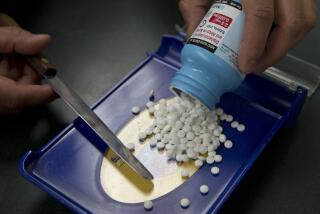New Chief Has Crisis Credentials : Health: Keith R. McKennon plans to be responsive to women having problems with Dow Corning’s breast implants.
- Share via
DETROIT — Keith R. McKennon has big-league experience in “managing high-profile public health and regulatory issues,” Dow Corning said. That’s why he was just named chairman and chief executive of the breast-implant maker.
If those credentials make him sound like a damage-control artist, McKennon insisted Tuesday that that is not his assignment.
“The first thing you do in this kind of controversy is learn where your fundamental responsibility lies,” he said. “And our overriding responsibility is to the women using silicone mammary implants made by Dow Corning.”
McKennon said he wouldn’t be saying that “if I were chiefly concerned with damage control.” The 58-year-old executive, who until last week was an executive vice president and director of Dow Chemical Co., said he plans to be responsive to women having problems with the firm’s breast implants.
Dow Corning now makes about 5,000 silicone products, including the silicone gel implants that are reported to have leaked.
Outsiders warned Dow Corning that it was worsening its problems and flunking the crisis-management test by appearing inadequately concerned about the women and uncooperative with the U.S. Food and Drug Administration’s investigation.
So the co-owners of Dow Corning decided last week to send in the broadly experienced McKennon, who earned his issue-management spurs during the Agent Orange controversy of the early 1980s.
He was quickly “retired” from Dow Chemical and “hired” by Dow Corning, which entailed a two-mile move across Midland in central Michigan.
Consultant Gerald C. Meyers, onetime chairman of defunct American Motors Corp. who studies such matters as a professor at Carnegie Mellon University in Pittsburgh, said Dow Corning seems to be shifting its focus from protecting the company to “doing something for and about the women involved. And it’s long overdue.”
Not that Dow Corning is changing its position, which is that the implants don’t themselves present an “unreasonable risk” to patients. Nor does the company admit to stonewalling the FDA or other allegations against it.
Dow Corning fought government efforts to obtain some company documents, which turned out to show that the company had known for many years of problems women were having with the implants. It finally made many of the documents public Monday, the same day it disclosed McKennon’s appointment.
“I thought it was reprehensible and it was damn dumb,” Meyers said of the delays. “They already had a problem with the implants, and they created a second crisis of public perception.”
McKennon, who was suffering from strep throat on Tuesday, his first day on the job, said he has been assured that all the relevant breast-implant documents have been turned over to the government, adding, “I’m going to verify that again . . . . With hindsight, I think there are some decisions that might have been made differently.”
Investment analysts describe him as a low-key operator. He describes himself as “non-confrontational, more consensus and team-oriented than unilateral, open, relentless in getting information.”
McKennon offered no specific plans, but said he will consider setting up advisory groups of women who have the implants and talked cautiously of the company perhaps paying for removal of problem implants for women who can’t afford it.
A native of Oregon and owner of oceanfront property there, McKennon has held several top management posts, including president of Dow Chemical U.S.A. His only tie with Dow Corning has been a seat on its board since 1987.
But it was his stint in the early 1980s as Dow Chemical’s vice president of government and public affairs during the controversy over Agent Orange, the toxic defoliant used by the U.S. military during the Vietnam War, that is given as his main qualification for his new job.
Dow Chemical, the main producer of Agent Orange, was the focus of lawsuits on behalf of veterans who blamed the defoliant for a range of illnesses in later years. The cases were ultimately settled with the creation of a $180-million fund that is still making payments to veterans and their families.
Meyers said Dow Chemical was behaving then like Dow Corning has behaved in recent months, but then reversed itself and negotiated a fair settlement even though it felt the technical evidence was in its favor.
Victor Yannacone Jr., a Patchogue, N.Y., attorney who in 1979 filed the first class-action Agent Orange suit on behalf of veterans, said Monday’s release of the documents by Dow Corning called to mind Dow Chemical’s behavior in the early 1980s case.
“Dow, of all the chemical companies, was the only one that behaved responsibly toward the vets,” Yannacone said. “They were willing to forego the delay by obfuscation that their power and influence would have permitted them.”
But Yannacone said Dow’s Washington law firm deserved most of the credit for that.
Meyers added, “The jury is still out about what they’re going to do next. The stage is set to do something responsible.”
More to Read
Inside the business of entertainment
The Wide Shot brings you news, analysis and insights on everything from streaming wars to production — and what it all means for the future.
You may occasionally receive promotional content from the Los Angeles Times.










